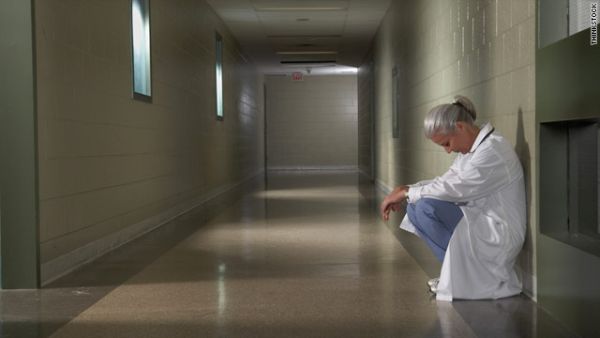
Every job comes with its pros and cons, and it is the attitude and managing capability of the person that makes him or her successful in pursuing a definite job. Given the present situation of ever changing global economy and recession, many feel lucky to land on some sort of job for daily bread and butter and job satisfaction takes a back seat. Statistics clearly indicate that rate of depression is higher among the jobless than those in jobs. In spite of these, there are several factors that make some jobs prone to depression. Relation with the employer, pay packet, managing work load and recognition are some vital factors that exacerbate depression in professionals. A careful study clearly indicates that people involved in jobs related to public dealing and social interaction are more likely to suffer from depression than other professionals.

1. Nursing
Nurses or personal care providers show the highest rate of depression (about 13 percent). One can easily imagine the plight that a nurse has to undergo while taking care of a number of ailing people with different mind set. Spending the day in feeding, bathing and maintaining patient records is quite daunting and in most of the cases their contribution goes unnoticed. Patients often place unrealistic demands and never hesitate in accusing the nurse in case the demands remain unfulfilled. Few patients are generous enough in expressing gratitude to the painstaking service of a nurse at home or in hospital.
2. Food service staff or waiters
Waiters show the second highest rate of depression of about 10 percent and 15 percent women involved in this service suffer from serious depression. Catering to the demands of a number of foodies in restaurants and eateries is not easy, and coupled with meager pay packets the job itself does not present a rosy picture. Dealing with rude public with a smiling face and sober attitude is tough indeed. People engaged in food service have to go through immense mental and physical exertion, and their service does not earn them the due recognition.
3. Social workers
Social workers also show pretty high rates of depression as it is tough to live up to the demands and expectations of the society with a poor pay packet. Moreover, dealing with the abused and mentally sick, destitute and orphans round-the-clock can be emotionally draining. The service of the social workers is taken for granted, and the society expects more and more sacrifices from them. As a result, they burn out fast.

4. Health care providers
Depression in health care providers mainly arises out of immense work pressure professional demands. Dealing with the uncountable sufferings of a number of patients daily often takes a toll on the mental health of the health care providers. The professional demands force them to sacrifice their personal life, and they seldom can manage few hours for self care. Prolonged dwelling in a sick and sad atmosphere is bound to have an adverse affect on the minds of the doctors and nurses.
5. Artists and writers
People with creative brains are also not spared from depression. About 9 percent of people involved in a creative profession have been under serious bouts of depression last year. Creative minds are often driven by passion and they tend to get hurt easily. Artists and writers survive with the inspiration and accolades from the audience. If there is a slide in the reputation or recognition, chances are high for them to go into depression. Long working hours, uncertain financial returns and isolated life style also contribute to depression in artists and writers.
6. Teachers
Ever increasing demands from the students, parents and institutional authorities often push teachers into depression. People take the teaching service as a selfless social commitment and they unhesitatingly go on piling complaints and grievances against the teachers without sparing a thought for them. Often, the student’s performance is judged by the teacher’s pedagogy rather than the student’s merit. Work pressure, social demands and not-so-healthy pay packet are vital factors for depression in the teachers.
7. Administrative staff
Administrative staff are quite prone to depression as they have to bear the brunt of every grievances put up by the public and the authority. In fact, they are often sandwiched by the demands and expectations of both the authority and public and satisfying everybody at the same time is near to impossible. They face the maximum criticism and minimum recognition. Controlling excessive work load and overstretched working hours make them vulnerable to depression.
8. Maintenance and ground staff
Maintenance and ground staff rush to such situations where things go seriously wrong. Their jobs involve life risks and health hazards but the returns are not at all satisfactory. People involved in maintenance jobs can suffer from depression due to the life risks involved in these jobs. They are like unsung heroes whose contributions fade fast after things come to normal. Frequent night shifts and unscheduled duty hours create immense mental pressure in maintenance and ground staff often leading them to depression.
9. Finance professionals
Finance professionals have to bear the burden of managing others’ finances, and that is quite stressful. Financial advisers have to manage the personal finances of millions in the best possible manner to provide them with the highest returns. They have to face the music in case of any unpredictable turnover in the financial market. The immense load of responsibility borne by them is enough to drive them towards depression.
10. Sales professionals
Sales jobs demand immense physical and mental endurance. Sales persons often have to travel a lot for brand promotion and to achieve the sales target set by the authority. Many sales professional suffer from job insecurity as their perks and pay checks are by and large dependent on achieving the sales target. They do not have any scheduled duty hours and their returns are always dependent on the sales report.
There is no doubt that some jobs are quite stressful while some involve minimum stress. Again, all jobs are not suitable for everyone. Individuals should pursue the right career after a careful judgment of his or her strength and weaknesses. Some are left with no alternative but to select a job of his or her disliking. In that case, they should change their attitude and try to accept the negative aspect of the job boldly. After all, it is better to be in some job than being jobless.



